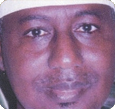Kebbi State Governor, Usman Dakingari yesterday became the second governor elected on the platform of the Peoples Democratic Party (PDP) to have his election nullified by the Election Petition Tribunal since the April 14, 2007 election.
Its Kogi State counterpart, Alhaji Ibrahim Idris has suffered the same fate on October 10 when the tribunal granted the prayers of the All Nigeria Peoples Party (ANPP) candidate, former governor Abubakar Audu that a fresh election should be ordered.
The Kebbi State Election Petition Tribunal headed by Justice Aodover Kaka'an also ordered that a fresh election should be conducted by the Independent National Elec-toral Commission (INEC) because the governor was not properly nominated as PDP candidate for the April 14 polls.
The governor's election had been challenged by the candidates of All Nigeria Peoples Party (ANPP), Senator Farouk Bunza Bello and the Democratic Peoples Party (DPP) in the election, Alhaji Abubakar Mallam.
According to the tribunal, Dakingari's nomination by the PDP as its gubernatorial candidate on February 5, 2007 as a substitute for Maj. Gen. Mohammed Magoro (rtd); whereas his membership candidate reads February 10, 2007 was a violation of the electoral law.
Dakingari had decamped from the ANPP alongside the former governor, Alhaji Adamu Aliero and was nominated by the PDP to replace Alhaji Bello Gwandu, the PDP candidate who was disqualified by the party. A letter by then PDP national secretary, Chief Ojo Maduekwe to INEC on April 10, had conveyed the decision of the party on the issue.
Said Justice Kaka’an, "We return to the issue as to whether the infraction of section 34(2) substantially affected the result of the election. Having held that no cogent and verifiable reason was given for the substitution of the first Respondent for the initial candidate of PDP, it means the 1st Respondent was illegally placed on the ballot paper. The question however is, was this a notorious fact known to the electorate of Kebbi State? In other words, was the electorate aware of the inherent legal defect on the first respondent but nonetheless cast a majority of votes for him? No evidence has been placed before us to provide an answer to these questions. We hold therefore that the infraction has not substantially affected the outcome of the Election".
The Judge explained that the agreement of the counsel to waive cross examination however robbed the tribunal an opportunity to assess the credibility of witnesses’ particularly Professor Mohammed Bello and Dr. Shehu Usman Gulumbe who authored exhibits R4 and R10 and admitted human error and simple errors of arithmetic.
“Notwithstanding the admission by INEC of certain irregularities, we have lost the benefit of these professionals or expert witnesses who should give answer under cross-examination to explain the magnitude of the irregularities occasioned by INEC staff in order to decide whether they substantially affected the result of the election. As things stand, we agree with the Respondent that Exhibits 19(A), (B) and (C) as well as Exhibits R4, R10 and R11 were dumped on us. We find the irregularities not proved therefore.”
The judge said every political party must comply with Section 34(1) and (2) of the Electoral Act which provides that any political party intending to change any of its candidate for any election shall inform INEC of such change in writing not later than 60 days to the election. Besides, he said the party must give cogent and verifiable reasons for substituting such candidate.
Said Justice Kakan "it must be stated from the onset that this provision does not derogate from the political parties their right to nominate a candidate of their choice. What the law says is that the reason for making a substitution must be cogent and verifiable. In the case of Ugwu-vs-Ararume (supra) the Court held in that case that this provision is mandatory and peremptory and not directory or permissive. The Court also held that "cogent and verifiable reason can only mean a reason self demonstrating of its' truth and which can be checked and found to be true."
The grounds of the two petitioners are: That Dakingari was at the time of the election, not qualified to contest the election; that the election was invalid by reason of corrupt practices and non-compliance with the provisions of the electoral act and that the governor was not duly elected by a majority of lawful votes cast at the election.
But in his reaction to the tribunal's verdict, Dakingari yesterday said he remains the governor and appealed to people of the state to remain calm.
Section 149 subsection (1) of the Electoral Act 2006 states that "if the Election Tribunal or the court, as the case maybe, determines that a candidate was not validly elected, then if notice of appeal against that decision is given within 21 days from the date of the decision, the candidate returned as elected shall, notwitstanding the contrary decision of the Election Tribunal or the court, remain in office pending the determination of the appeal".
Sub-section 2 states: "If the Election Tribunal or the court, as the case maybe, determines that a candidate as elected was not validly elected, the candidate returned as elected shall notwithstanding the contrary decision of the Election Tribunal or the court remains in office pending the expiration of the period of 21 days within which an appeal may be brought".
He said his party, the PDP will appeal the judgment at the Election Petition Appeal Tribunal.
According to him, the electorate elected him on April 14 based on his popularity and that was why he scored the highest number of votes as affirmed by the tribunal.
The governor said “As we are all aware, this morning, the election petition tribunal has given its decision in which it affirmed that I was the person who was elected by the majority of lawful votes. That indeed the election was free and fair. The tribunal has, however, nullified my election on the ground that I did not state the date I joined the Peoples Democratic Party (PDP). But the Tribunal accepted that I left the All Nigeria Peoples Party (ANPP) on the 2nd of February 2007.
“I know for a fact that you did not vote for me on account of the date I joined the PDP or as an independent candidate. But you voted for me because you truly believed in me and my party and I possessed the qualities of the leader you want," he said.
The governor said the judgment was faulty and was an attempt to distract the people of the state.
He said two of the five members of the tribunal disagreed with the verdict and refused to sign the ruling.
“We consider this judgment an attempt to distract us, as the judgment is not a unanimous decision of the members of the Tribunal. The judges themselves were divided. Two of the panel members did not only disagree with their colleagues but refused to sign the judgment. But I can assure you that we shall not be distracted".
Dakingari assured the people of the state that his administration will continue to work for the people and make the state a model state.
He said as a democrat and believer in the rule of law, he will continue to pursue legal means adding that the judgment did not appear to have captured the popular opinion of the people of the state as fully expressed in April 2007.
"I wish to invite all and sundry to remain calm, continue to be law abiding, allow law and order to continue to provide the framework for all that we do," the governor said.
However, the National Chairman of the All Nigeria Peoples Party (ANPP), Chief Edwin Ume-Ezeoke has commended the election tribunal in Kebbi State for its decision on the petition of the party's gubernatorial candidate in the state.
In a statement signed by the National Chairman of ANPP, he stated, “This news is gladdening and it shows that judiciary is out to save democracy from total collapse in Nigeria.”
He also stated that by the nullification of the election of Governor Dakingari, the judiciary has gone a long way in redeeming its image as "the last hope of the common man”.
According to Ume-Ezeoke, "More of this fraudulent elections would not stand the test of time as these fraudulent elections would be cancelled. Judiciary is the hero Nigeria’s democracy and our plea is that the judiciary should keep the good job on, so that all the fraudulent elections would be judiciously addressed," the ANPP Chairman stated.
In his reaction, Mr. Andy Ezeani, Media Assistant to the National Chairman of the Independent National Electoral Commission (INEC), said: "the tribunal ruling in Kebbi State shows that the fault, if any, is that of the political party in not ensuring that their candidate is a bonafide member of the party. The actual conduct of the election was not faulted. This is a fact, not a statement".
From Chuks Okocha in Abuja and Saka Ibrahim in Birnin Kebbi
This Day
Sunday, October 21, 2007


![[PRESS RELEASE] AFFIRMATION OF EMERGENCY RULE IN RIVERS STATE THROUGH “AYES AND NAYS”](https://www.nas-int.org/wp-content/uploads/2025/03/National-Assembly-Ayes-and-Nays-400x250.jpeg)

